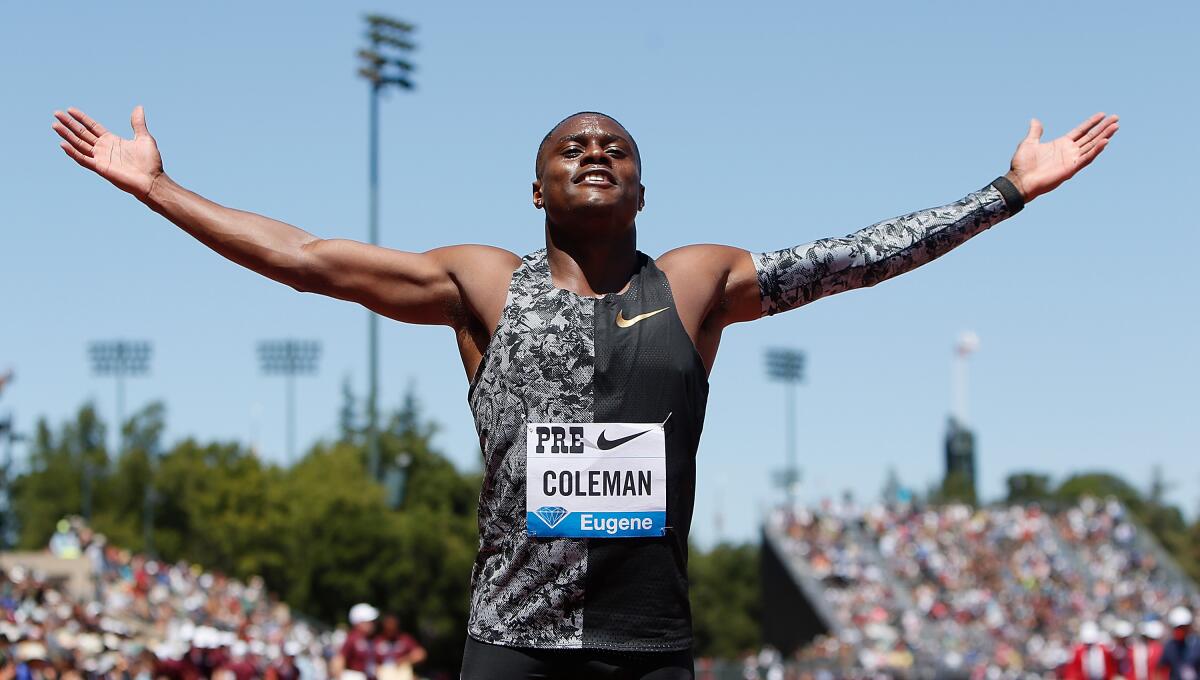U.S. sprinter Christian Coleman wants apology from anti-doping officials

- Share via
Anti-doping authorities have dropped their charge against Christian Coleman, but the top American sprinter does not consider his case closed.
In a lengthy video posted online Wednesday, Coleman asked for a public apology and talked about the testing protocol applied to him and other elite athletes.
The reigning U.S. champion at 100 meters faced a so-called whereabouts charge, meaning he wasn’t at home on three occasions when authorities came to his residence to administer a surprise test. The disposition of his case last week makes him eligible for the upcoming world championships in Doha, Qatar, where he is favored to reach the podium.
“I feel really good in practice,” he said in the 22-minute video posted on YouTube. “I’m excited to go to Doha and bring back some medals.”

But the 23-year-old harbors ill feelings about the charge and the fact that it was leaked to the public.
“I felt like a victim … like I was being attacked,” he said. “Like they were trying to go after the biggest name in the sport, a big fish.”
Track athletes must keep the U.S. Anti-Doping Agency apprised of their whereabouts and be there, or nearby, if testers make an unannounced visit during a 60-minute window on any given day. If an athlete misses three tests in a 12-month period, he or she can face a two-year ban.
Coleman said he gets tested 30 to 40 times a year — USADA put the number at 20 — and that he sometimes forgets to file updates about his location online.
His troubles began in June 2018 when testers came to his home while he was in Oregon to have an injury treated. About eight months later, he missed another test when his daily workout was moved to an earlier time and he did not respond to phone calls from a tester waiting at his front door.
Last April, he missed a third test after deciding at the last minute to accompany the track team from the University of Kentucky, where he trains and is a volunteer coach, to the Drake Relays in Iowa. On that occasion, Coleman answered the tester’s call and asked if he could be tested by anti-doping authorities at the meet, but was told that wasn’t possible.
Coleman said he immediately went to a private lab to submit a sample that would prove he was clean, but the incident was recorded as his third miss in a year and USADA initiated a case against him.
The 100-meter dash has a history of cheating, including high-profile scandals involving disgraced Olympic champion Ben Johnson and current American star Justin Gatlin. Sprinters face particular scrutiny from anti-doping authorities.
“It’s a crazy amount of times I’m tested,” Coleman said. “The likelihood of me forgetting and them coming to test me is far greater than the average athlete.”
But, he added, “I’m not making excuses, it’s what comes with the job.”
USADA withdrew its charge against him last week after consulting with the World Anti-Doping Agency. Authorities cited a technicality by which Coleman’s first missed test should have been backdated to the beginning of the quarter in April, giving him only two misses in 12 months.
“Every athlete is entitled to a presumption of innocence until their case is concluded through the established legal process,” USADA Chief Executive Travis T. Tygart said in a statement. “This is certainly the case for Mr. Coleman, who has been found by USADA not to have committed a whereabouts violation and is fully eligible to compete under the rules.”
Coleman won the silver medal in the 100 meters at the 2017 world championships and is the fastest man in the world this year.
The USADA charge forced him to skip two recent meets, forgoing a potential $150,000 in prize money, he said. He also had to pay a lawyer to represent him, but wonders about the cost to his reputation in a sport where fans remain highly skeptical.
“It was truly disheartening,” he said. “I’ll just continue to work hard, to continue to do the things I’ve always done.”
More to Read
Go beyond the scoreboard
Get the latest on L.A.'s teams in the daily Sports Report newsletter.
You may occasionally receive promotional content from the Los Angeles Times.











